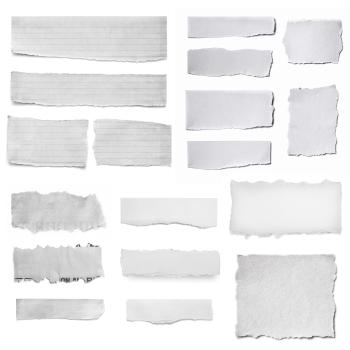Research Building Blocks: "Organize This!"

- Preview |
- Standards |
- Resources & Preparation |
- Instructional Plan |
- Related Resources |
- Comments
Overview
Children are naturally curious—they want to know "how" and "why." Teaching research skills can help students find answers for themselves. In this minilesson, students organize the information they have compiled through the research process by using sentence strips. Students first walk through the process using information on Beluga whales as a model. Students match facts written on sentence strips to one of four categories: appearance, behavior, habitat, and food. Sentence strips are color-coded to match each category. The sequence of notes (sentence strips) under each category are placed in an indented outline form, and regrouped so that similar facts are placed together. Next, the appropriate Roman numerals and letters are added to the outline. Finally, students use the same process to create outlines for the research topics they are working on.
From Theory to Practice
Teaching the process and application of research should be an ongoing part of all school curricula. It is important that research components are taught all through the year, beginning on the first day of school. Dreher et al. explain that "[S]tudents need to learn creative and multifaceted approaches to research and inquiry. The ability to identify good topics, to gather information, and to evaluate, assemble, and interpret findings from among the many general and specialized information sources now available to them is one of the most vital skills that students can acquire" (39). In her article "Rethinking Research," Eileen A. Simmons agrees: "We can't expect students to produce outstanding research papers unless we teach them strategies for gathering information, analyzing, synthesizing, and evaluating that information through critical thinking." (115)
Further Reading
Common Core Standards
This resource has been aligned to the Common Core State Standards for states in which they have been adopted. If a state does not appear in the drop-down, CCSS alignments are forthcoming.
State Standards
This lesson has been aligned to standards in the following states. If a state does not appear in the drop-down, standard alignments are not currently available for that state.
NCTE/IRA National Standards for the English Language Arts
- 1. Students read a wide range of print and nonprint texts to build an understanding of texts, of themselves, and of the cultures of the United States and the world; to acquire new information; to respond to the needs and demands of society and the workplace; and for personal fulfillment. Among these texts are fiction and nonfiction, classic and contemporary works.
- 3. Students apply a wide range of strategies to comprehend, interpret, evaluate, and appreciate texts. They draw on their prior experience, their interactions with other readers and writers, their knowledge of word meaning and of other texts, their word identification strategies, and their understanding of textual features (e.g., sound-letter correspondence, sentence structure, context, graphics).
- 4. Students adjust their use of spoken, written, and visual language (e.g., conventions, style, vocabulary) to communicate effectively with a variety of audiences and for different purposes.
- 5. Students employ a wide range of strategies as they write and use different writing process elements appropriately to communicate with different audiences for a variety of purposes.
- 6. Students apply knowledge of language structure, language conventions (e.g., spelling and punctuation), media techniques, figurative language, and genre to create, critique, and discuss print and nonprint texts.
- 7. Students conduct research on issues and interests by generating ideas and questions, and by posing problems. They gather, evaluate, and synthesize data from a variety of sources (e.g., print and nonprint texts, artifacts, people) to communicate their discoveries in ways that suit their purpose and audience.
- 8. Students use a variety of technological and information resources (e.g., libraries, databases, computer networks, video) to gather and synthesize information and to create and communicate knowledge.
- 11. Students participate as knowledgeable, reflective, creative, and critical members of a variety of literacy communities.
- 12. Students use spoken, written, and visual language to accomplish their own purposes (e.g., for learning, enjoyment, persuasion, and the exchange of information).
Materials and Technology
Colored paper (four different colors)
Printouts
Websites
Preparation
Before beginning this lesson, students should be familiar with the research skills covered in the following lessons:
Student Objectives
Students will
- create and use graphic organizers.
- work with students to brainstorm category labels.
- generate categories and subheadings.
- sort note cards into categories or subheadings.
- practice outlining skills.
Instruction & Activities
The way in which the following example is used to “discover” outlines can be adapted to any research topic. Modeling a topic in which all the class is involved will demonstrate the step-by-step procedure that can then be applied later by small groups or individuals as they work on their own projects.
Research Topic: Beluga Whales
Big questions/Categories:
- What do Beluga whales look like? (Appearance)
- How do Beluga whales behave? (Behavior)
- Where do Beluga whales live? (Habitat)
- What do Beluga whales eat? (Food)
Procedure
- Hand out the Example Outline Format and explain that students will be making sentence strips for their research topic.
- Model the activity by making a sentence strip and placing it on the board using the Beluga whale topic or one of your own choosing.
- Record each big question or category on a different colored sentence strip and place it on the board.
- Give members of the group or class colored sentence strips.
- Remind students to match the color of the sentence strip on which the fact is written to that of the big question (category) it is about, recording only ONE fact fragment (note) on each strip. These do not have to be complete sentences.
- Students bring their fact strips to the board and place them under the appropriate big question/category (same color strip) indenting them as in outline form.
- After all strips are placed on the board, the sequence of the notes under a big question/category may be changed to place similar facts together. This will help the facts flow once the students start writing.
- Add the appropriate Roman Numerals (categories) and letters (notes) to create an outline form. (See Sample Outline on the Beluga whale.)
- Remind the students that an outline highlights the essential information they want to include in their final product and helps organize their information. Modeling for students how to use an outline enables them to determine the sequence of their report. It is important for students to learn that they decide which information is most important for their readers to know at the beginning of the report, and to think about ways to make the report flow from section to section.
- Have students practice outlines for the research topics they are working on.
- Mini-lessons can be repeated for different topics until students become comfortable with the skill of outlining.
- If this method of outlining and organizing information is not appropriate for your students, other graphic organizers are available online.
Extensions
Student Assessment / Reflections
As this is only one step in teaching the research process, students need not be graded on the activity. Continued practice using outlines and other graphic organizers on different topics, with teacher and peer feedback on in-process and finished outlines, would best benefit the student researcher. Final outlines turned in with the research report could then be graded based on accurate information and logical organization.
